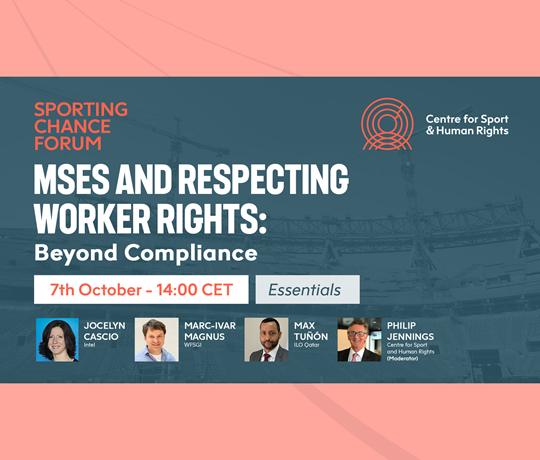MSEs and Respecting Worker Rights - Beyond Compliance
Session Summary
Sport and sport event delivery is more aware of the need to know and show respect for human rights, not least the rights of workers. This requires leadership and culture change, including commitments from governments, sports bodies (large and small) and corporate partners, as well as top-level ownership, policies, and due diligence systems to assess risks to workers (including any salient risks, such as forced labour), to track performance, and to provide corrective action and remediation where worker’s rights are abused. Putting words into action demands executive-level oversight, resourcing, training, and transparent communications encompasses success story and a frank look at challenges faced, mistakes made and where lessons can to be learnt.
Sport’s most prestigious events should be planned and delivered in line with international human rights and labour standards. A new social contract – involving negotiated agreements between event host organisers, employers and workers’ representatives - could ensure Games delivery and legacies that support job creation, skills development and respect workers’ rights (including vulnerable/migrant workers), and which recognise freedom of association and collective bargaining as legitimate means of ensuring decent work in hosting countries and across sport’s supply chains.
In 2017 the International Labour Organization (ILO) entered a technical corporation programme with Qatar’s government to implement comprehensive labour reforms. Since the ILO Doha Office opened in 2018, support from Qatar’s Government, international trade unions, and employers' organisations has seen laws and policies introduced to dismantle the Kafala employer-sponsorship system, a non-discriminatory minimum wage, promotion of dialogue between workers and employers, and enhanced protections for domestic workers and around occupational health and safety (e.g. mitigating heat stress).
Global scrutiny that comes with FIFA World Cup hosting has accelerated labour reform in Qatar, but the World Cup is not the finish line. The labour reform agenda – which aligns with Qatar’s national development strategy and vision for 2030 – has laid important legal and policy foundations, but implementation is incomplete. As in many contexts, there has been resistance to change and work is still needed if Qatar is to cement the benchmark it has started to set for the Gulf region. Models developed for World Cup construction sites are being replicated and adapted for other sectors (e.g. hospitality), but more can be done to improve practice among construction contractors and clients beyond 2022, other sectors, and in the sphere of domestic work.
ILO and Qatar Government cooperation is being extended to 2023, prioritising acting on: 1) the non-payment of wages and benefits (the number one concern of workers) - a new wage protection system has improved the detection of wage-related abuses, and penalties have risen for wage non-payment but these need to take effect faster and outstanding wages paid sooner; 2) streamlining access to justice – building on an online complaints platform and new system of labour courts, work is needed to address a case backlog and to shorten the time is takes for workers’ cases to be heard (e.g. by boosting the number of labour courts); 3) fully implementing the Kafala reforms – labour mobility has increased substantially in the year since the new laws came in, but unscrupulous employer retaliation against workers that look to change jobs needs to be halted; and 4) applying domestic worker labour protections, especially on working hours and time off.
The Supreme Committee for Delivery and Legacy for FIFA World Cup 2022 has introduced joint-committee platforms to which workers are elected, have a voice and can engage with management in dialogue. They are being used to train workers, worker representatives, and management representatives on human rights issues (e.g. grievance handling, harassment at work) and are cascading national reforms into the workplace. The government, employers and workers are starting to see the mutual benefits. For example, by listening to workers, providing decent working conditions and increasing labour mobility, employers are more able to attract and retain the best talent.
All stakeholders inside and outside Qatar – including sponsors, football associations, players, fans and others – have a role to play in helping the labour reforms to take root before and after the FIFA World Cup 2022. It is important to get properly informed about the issues and status of the labour reforms (some social media reporting is incomplete), but also to exert leverage, such as by doing due diligence on those with whom you interact on a daily basis, e.g. inserting decent work clauses in commercial contracts signed with Qatari suppliers (e.g. hotels or transport providers), or requiring business partners to complete human-rights related questionnaires.
Leading brands and manufacturers - including sport partners like Intel and the World Federation of the Sporting Goods Industry (which operates WFSGI’s Pledge behind the FIFA Quality Programme for all FIFA licensees) - are increasingly seeing the value of collective rather than unilateral solutions to respecting worker rights in the supply chain. There is a shift from compliance, the proliferation of individual codes of conduct, and tick-box audits - which were creating inefficiencies and confusion and often of limited practical benefit to workers - to collective and integrated approaches to drive standards.
The Responsible Business Alliance (electronics sector) through its Responsible Labor Initiative, and the WFSGI via its Responsible Sport Initiative, are among those sharing factory audits, pooling costs, learning and good practice. Strong emphasis is place on capacity-building to raise the business acumen of suppliers and entry-level brands. Activities include new practical tools, position papers and webinars, facilitating factory exchange visits to see how worker-management engagement is done, lending experts (e.g. supply chain managers or in-house lawyers) from larger or more experienced firms to advise those with fewer resources or less experience, and convening platforms so competitors can exchange ideas since sharing suppliers, means shared responsibility.
Watch the full session here
Click here to watch the SCF21 sessions on demand on YouTube